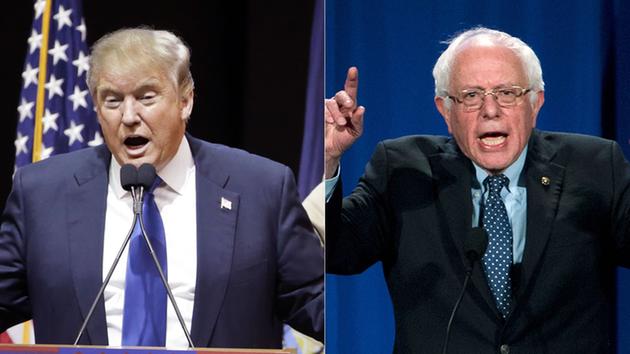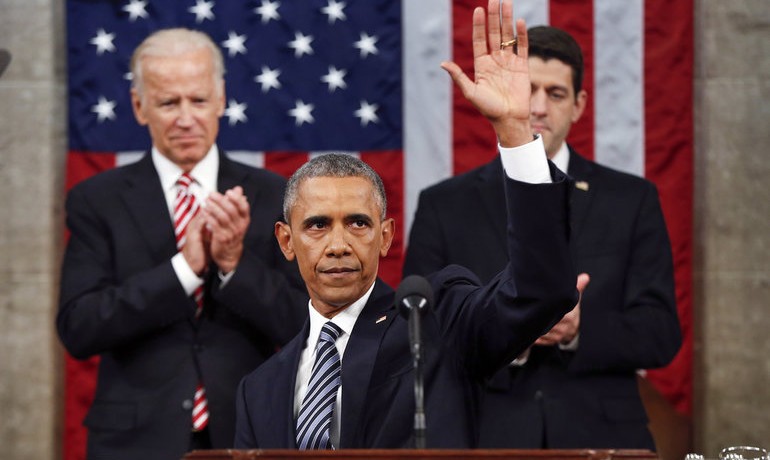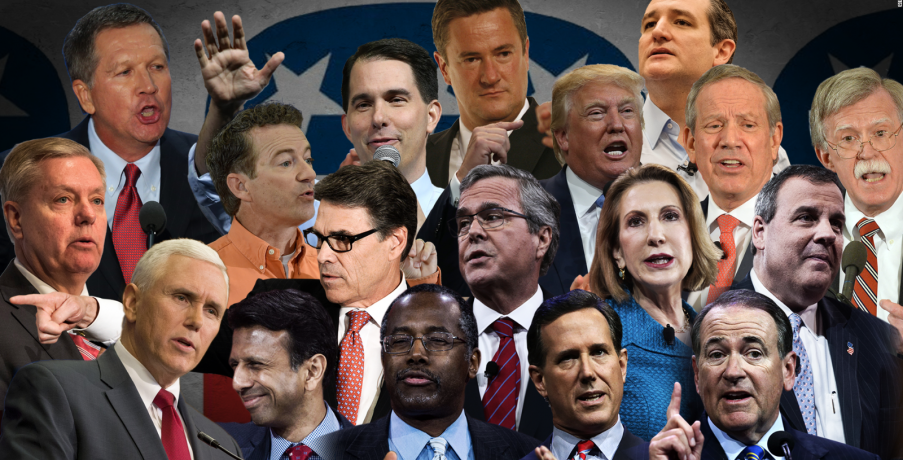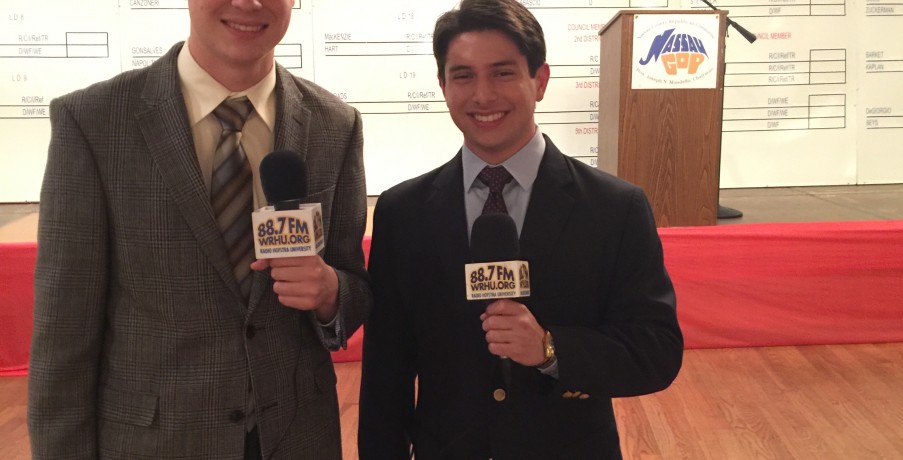
-
American Political System Analyzed: Benefits and Liabilities
Post Views: 2,030By Neil A. Carousso
The American political system is complex and unfortunately, many citizens don’t pay attention to the political processes. In a presidential election year, campaigns are highly publicized in mass media and there are frequent Democratic and Republican debates. Therefore, there is ample opportunity for the American public to understand the issues, hear the rhetoric from each of the candidates and make educated votes in the primaries and general election. Those who pay attention to Congressional, state and local politics understand the governmental system overall, but in the 2014 midterm elections, just 36.4 percent of eligible voters casted ballots.
Voter turnout is a consistent issue. Every week, new polls are released showing candidates’ standing among the voter population; these numbers are only as good as voters showing up to the polls and being truthful in their responses to the pollsters. For example, Donald Trump has consistently been the GOP front-runner based on polls. The real-estate mogul won the New Hampshire Primary and South Carolina Primary, but lost in the Iowa Caucus to Texas Senator Ted Cruz, despite leading in the entrance polls. Last night, he got a huge win in the Nevada Caucus, earning 12 delegates with 45.9 percent of the vote. Florida Senator Marco Rubio was the closest behind Trump, earning 5 delegates, as did Cruz, with 23.9 percent of the vote. Polls can be deceiving, but voter turnout is a factor in consistency between the polls and primary and caucus results. In fact, 74-year-old Democratic presidential candidate Bernie Sanders won the young vote in Saturday’s Nevada Caucus. Seventy percent of young voters, ages 18-44, voted for Senator Sanders. He has been quoted in saying that he needs young voters to head out to the polls in order for him to win the Democratic nomination.
Another hurdle Bernie Sanders will have to jump is the political system that he has frequently called “rigged.” Not only will he have to win a majority of delegates in order to be the party nomination come time for the Democratic National Convention (DNC) in Philadelphia, Pennsylvania in July, but also he will have to change the minds of Superdelegates which only exists on the left. Currently, former Secretary of State Hillary Clinton has 503 Superdelegates as opposed to Sanders’ 70 Superdelegates. These Superdelegates are party leaders who can change their minds up until the DNC, but the democratic socialist will have to change Superdelgates’ minds by winning a slew of consecutive states, in particular southern states, which is how then-Senator Barack Obama won over the Superdelegates and beat Mrs. Clinton for the 2008 Democratic nomination. In order to overcome these obstacles, not only will Sanders need high voter turnout from millennial voters who are overwhelmingly attracted to his narrative, but he will also need to encourage minority voters to “feel the Bern” and buy into his rhetoric that the middle class lacks opportunity because the super rich controls the economy and political system. It’s important to note that Senator Sanders considers anyone who makes over $120,000 wealthy. Those people, according to Sanders, seemingly gained wealth through inheritance, entitlement or potentially risky business behavior rather than through hard work, motivation and merit, at least from what Sanders portrays to his supporters at campaign rallies, debates and town halls.
Senator Sanders’ message resonates with people who are fed-up with corrupt politicians and the top 1 percent of the nation’s wealth. That’s another reason why some Clinton supporters from 2008 may have switched to supporting Sanders in 2016, because they do not trust Mrs. Clinton who is currently being investigated by the Federal Bureau of Investigation for allegedly sending and receiving classified emails on a private email server set-up in her residence. This investigation could lead to an indictment if accusations of CIA operatives’ names mentioned in her illegal private email server prove to be true. In addition, there are still questions and concerns about her record as Secretary of State and whether or not she told the truth about how the Benghazi attack on September 11, 2012 was initiated. Parents of our fallen brave American soldiers have even said on cable television, including Fox News Channel’s “Kelly File” program hosted by Megyn Kelly, that Mrs. Clinton lied to their faces about the Benghazi attack being commenced following an anti-Muslim video when in fact, it was proven after an intensive investigation, that there was no protest and the attack that killed U.S. Ambassador J. Christopher Stevens was premeditated. On Thursday, October 22, 2015, Clinton sat for 11 hours answering questions about the Benghazi attack and her involvement in a Washington, D.C. hearing. Her critics believe she answers questions methodically and politically and simply don’t trust her because she has made a career out of politics.
Clinton has tried to separate herself as an establishment candidate by stating on at least three separate occasions that she would make history as the first woman president. Before taking Senator Sanders as a serious candidate, she relied on her moderate views, almost running a general election from the start of her campaign, but since then she has changed her rhetoric to prove she is as much a liberal as Bernie Sanders, even making a statement that Sanders is not a true Democrat at last week’s MSNBC Town Hall event in Nevada. In addition, the Clinton campaign cut a commercial of young girls saying how much they want a woman for president in what many critics called a manipulative maneuver. During a debate, Mrs. Clinton called Senator Sanders sexist after Sanders claimed that “all the shouting in the world” would not enact gun control. In response, Clinton said “It’s just when women talk, people think we’re shouting.” In interviewing about ten Hillary Clinton female supporters at a rally in New Hampshire earlier this month, this journalist received similar responses in reasons for their support of the former Secretary of State. Each of them were voting for Mrs. Clinton because she is a woman and were vague and perhaps unclear about her stances on national security, foreign policy and taxes, but the responses were passionate; her supporters just believe she will get the job done and as a woman will have a certain compassion as chief executive. Most of the female Clinton supporters this journalist spoke with in New Hampshire agreed with feminist icon and the first woman Secretary of State Madeleine Albright’s comments at a Clinton rally earlier this month that “There’s a special place in hell for women who don’t support other women.” Albright has since apologized for the setting in which she made those statements but not for the content. Other female University students were vocal that Albright’s declaration was sexist in nature and that in this day and age, no person should be told who to vote for based on gender. And that could be extended to include voting for people for any other superficial reason.
Motifs in this presidential race seem to be channeled anger and the desire for a so-called political outsider. Those are reasons for Bernie Sanders’ rise in the polls, which is unprecedented being the fact that he considers himself a democratic socialist as an independent senator, representing Vermont. As a true political outsider, Donald Trump has channeled Americans’ frustration with career politicians who are perceived to be controlled by special interests and lobbyists who contribute substantial campaign contributions. To give some perspective in this year’s fascinating election year, Governor Jeb Bush of Florida, who is considered an experienced, moderate Republican candidate, received $130 million, but earned zero delegates. He suspended his campaign on Saturday in South Carolina after coming fourth in the primary with 7.8 percent of the vote. Meanwhile, Mr. Trump has spent about $25 million of his own money, receiving a plethora of media attention in the form of interviews and news stories. For voters, they care about the message the candidate delivers; money doesn’t guarantee campaign success.
Money is a true liability for politicians. It brings a tremendous amount of responsibility and the perception that they can be bought with campaign contributions. In reality, it costs a lot of money to disseminate one’s message and opinions on the issues to constituents whether running for president, Congress or local office. Candidates and incumbents need to consistently make contact with constituents via phone and in person. On average, incumbent Congressmen spend four hours a day trying to raise money.
Now while there are certain negative perceptions about the political system in regards to campaign money, corruption and other scandals, there are also concerns about the interests of politicians to genuinely serve the public. The latest Gallup poll indicates that 81 percent of those polled are dissatisfied with Congress. Americans believe the institution of Congress has major problems and does not work with the president efficiently. However, 96.4 percent of incumbents were re-elected in 2014. The last major shake-up in Congress was in 2010 when Republicans took control of the House of Representatives. The incumbent re-election rate was 86 percent, the lowest since 1970; yet, it’s still a very high rate. These numbers indicate that while Americans are generally dissatisfied with Congress, they like their own Congressman or Congresswoman. It’s an odd trend that indicates the strength of the political system and the power voters truly have in who represents them in government.
It may seem that there are more liabilities than benefits in the American political system, but consider the fact that the framers fought for our right to vote and have a say in the political process. That’s a major benefit. The country of the United States of America was formed on the notion that “We the people” have the right to elect politicians who represent our concerns, needs, wants and point-of-views on the issues. The public can be as engaged as they would like to be in the political process on any level, especially when decisions directly effect their quality of life and issues like education, economic policy, budgets and public safety. While this presidential election cycle is compelling and is important for the future of our nation from top to bottom, the state and local governments have a profound impact on residents’ daily lives. But, only 29 percent of New York residents went out to the polls this past November to vote in the midterm elections. Only Texas and Indiana had a lower turnout at 28.9 and 28.8 percent respectively.
There are major benefits to the American political system, especially in a presidential election year. There is constant media coverage on not only cable networks like MSNBC, CNN, Fox News Channel and C-SPAN that specializes in political coverage, but also the major networks like CBS, NBC and ABC. In addition, with the Internet and other media sources available, there is no excuse for citizens to be uninformed. Our political system is also founded on the three branches of government with checks and balances that allow for an even distribution of power. Our system is very intricate and organized. America is considered one of the top if not the greatest developed nation in the world. Nevertheless, there are some liabilities including the role of money in our political processes making fundraising about a third of a Congressman or Congresswoman’s job. The rise of Political Action Committees or PACs and Super PACs portray a perception that his or her donors influence politicians. That perception can be equated to the public’s low approval rating of Congress and overall cynicism of political campaigns.
In conclusion, there are certain benefits and liabilities of the American political system. In this presidential election year, there is an excitement about politics and about individual candidates because of a message that may resonate with voters. Clearly, there is room for improvement, citing low approval ratings and voters’ cynicism. Unfortunately, no presidential candidate can make America perfect in the eyes of all citizens. However, it takes all politicians and levels of government to work together according to the U.S. Constitution to improve economic conditions and social circumstances as our society evolves.
-
Right Track or Wrong Track: Analyzing the State of the Nation
In News StoriesPost Views: 1,836By Neil A. Carousso
Americans yearn for change and a government that works in unison.
In analyzing the data from the Pew Research Center, NBC News/Wall Street Journal, CBS News/The New York Times, Bloomberg Politics, CNN/ORC and other polls about whether or not Americans are satisfied in the direction the United States is heading, overall American citizens are always dissatisfied since the start of the poll dating back to as early as the 1990s at several organizations. Specifically looking around September 11, 2001 when our country faced the worst terrorist attack in the nation’s history, Americans were at a high point in regards to satisfaction at 57 percent, according to the Pew Research Center. That may be surprising, but it could be the mentality that we bound together to fight against terrorism and attack those who infiltrated our country. Since 2003, however, the satisfaction rate has been sharply on the decline, reaching as low as 17 percent for three consecutive poll periods in 2011.
Currently, there is growing concern and fear about ISIS radicalizing our own citizens and infiltrating our country. Many Americans feel that we are most likely the main target for ISIS following the recent devastating attacks in Paris. ISIS has even published recruitment videos online featuring our own politicians like 42nd President Bill Clinton and GOP front-runner Donald Trump indicating that they are planning to attack the U.S.
In the wake of these ISIS-inspired threats and attacks like the San Bernardino shooting and other mass shootings like the Sandy Hook Elementary School shooting, President Barack Obama has voiced his opinion for the need for stricter gun laws and continues to blame Congress failed legislation. That leads to the larger issue: Americans are not content with the fractured relationship between the President and Congress that has led to a government shutdown during Obama’s presidency and a number of executive orders without the normal checks and balances required to pass legislation. Many Americans would put fear and incompetency at the top of their lists as to why 72 percent, according to the Pew Research Center, are dissatisfied with the current state of the U.S.
Donald Trump, the GOP presidential front-runner has campaigned on the fact that he is not a career politician and has been a successful and competent businessman who would run the country like a business and make profits for the country. Other GOP candidates like Ted Cruz have been against the political establishment as well, but Trump’s harsh and consistent stances on immigration and national security have resonated with a large amount of voters who are dissatisfied with Obama’s job as president and feel a sense of patriotism in Trump’s rhetoric.
Furthermore, Democrats may have a difficult time retaining control of the White House in 2016. Many believe the political left has been too soft on security. For instance, President Obama plans to accept 10,000 Syrian refugees into our country where we do not have a new terrorism alert system in place, although the FBI is currently working on one, and we lack substantial background information on the refugees making the vetting process very difficult. The Paris attack was infiltrated by a suspected refugee who happened to get across a weak border in France. Latest intelligence has indicated that ISIS did research on what borders were less secure and the refugee passed background checks. Many Americans wonder: why couldn’t that situation happen in the United States? Citing the recent San Bernardino shooting, the suspected shooter Tashfeen Malik, who was a Pakistani woman killed by police after the mass shooting, was in the United States on a fiancée visa, which does not require an extensive background and vetting process. All of these ongoing national security concerns are major reasons why Americans are dissatisfied in the direction the country is going and can support why Mr. Trump or another GOP candidate may have a better chance of taking the presidency in 2016.
Recent history shows that when a president serves two terms in office, sometimes the opposite party will win the next election because of the need for change. For instance, most recently, after Republicans controlled the presidency from 1981-1993 between Ronald Reagan and George H.W. Bush over 3 terms, Democrat Bill Clinton was elected and served two terms before George W. Bush served two terms, himself. And President Obama is finishing his second term in office. However, if this trend does not continue and the Democratic front-runner Hillary Clinton succeeds Obama, Republicans argue that Americans can expect the same level of dissatisfaction, especially as Clinton made it clear at the last Democratic debate, televised by NBC News, that she will fight to maintain the same policies President Obama has initiated.
Even if Clinton decided to separate herself from Obama as we near the general election, if she is the Democrat nominee, one cannot disregard the fact that she served as secretary of state under President Obama for four years before resigning due to illness. Not only have we faced turmoil in foreign relations, but also her illness may speak to the fact that she may not be able to handle the stresses of the presidency if she had to resign from her secretary of state position.
The national mood is certainly affecting Clinton and the other Democratic candidates by voters who want a tough president who will keep the country safe and reform immigration by securing our borders.
-
Julianne Thompson Talks National Security Plans by GOP Field; Criticizes Front-Runner Donald Trump
Post Views: 5,076Julianne Thompson, founder of the Free America Project, former co-chairman of the Atlanta Tea Party & former press secretary of the Georgia Republican Party joined Neil A. Carousso’s morning show to discuss the GOP strategy in 2016 and the national security plans put forth by the Republican candidates plus Donald Trump’s latest plea to keep Muslims out of the United States.
-
Experts Weigh in on Fighting the War on Terror
Post Views: 2,927Terror and Political Expert Donald Mazzella joins Neil A. Carousso’s morning show to talk about fighting the “War on Terror” and how the United States, France and other countries should combat ISIS plus how politicians, including President Barack Obama should handle the situation.
In addition, Dr. Ken Yeager, Ph.D., Associate Professor of Psychiatry at The Ohio State University Wexner Medical Center discusses travel anxiety during the holiday season in the wake of terror threats at U.S. Airports with Carousso.
-
Election Night 2015
Post Views: 2,584Neil A. Carousso is the lead political reporter for WRHU-FM on Long Island, New York. On Tuesday, November 3, 2015, he reported live from the Nassau County GOP Campaign Headquarters for WRHU’s annual election night broadcast, covering the Nassau District Attorney election and the 19 Nassau Legislator races.
News Stories
Social Feeds

VIDEO: Told the airline to book us on the next flight out (SPONTANEOUS TRIP!)

VIDEO: The Taylor Swift Effect | WCBS Business Breakfast

VIDEO: Future of NYC | WCBS Business Breakfast

VIDEO: Reasons for New Yorkers to be Optimistic | WCBS Business Breakfast

VIDEO: NYC's AI Chatbot | WCBS Business Breakfast






